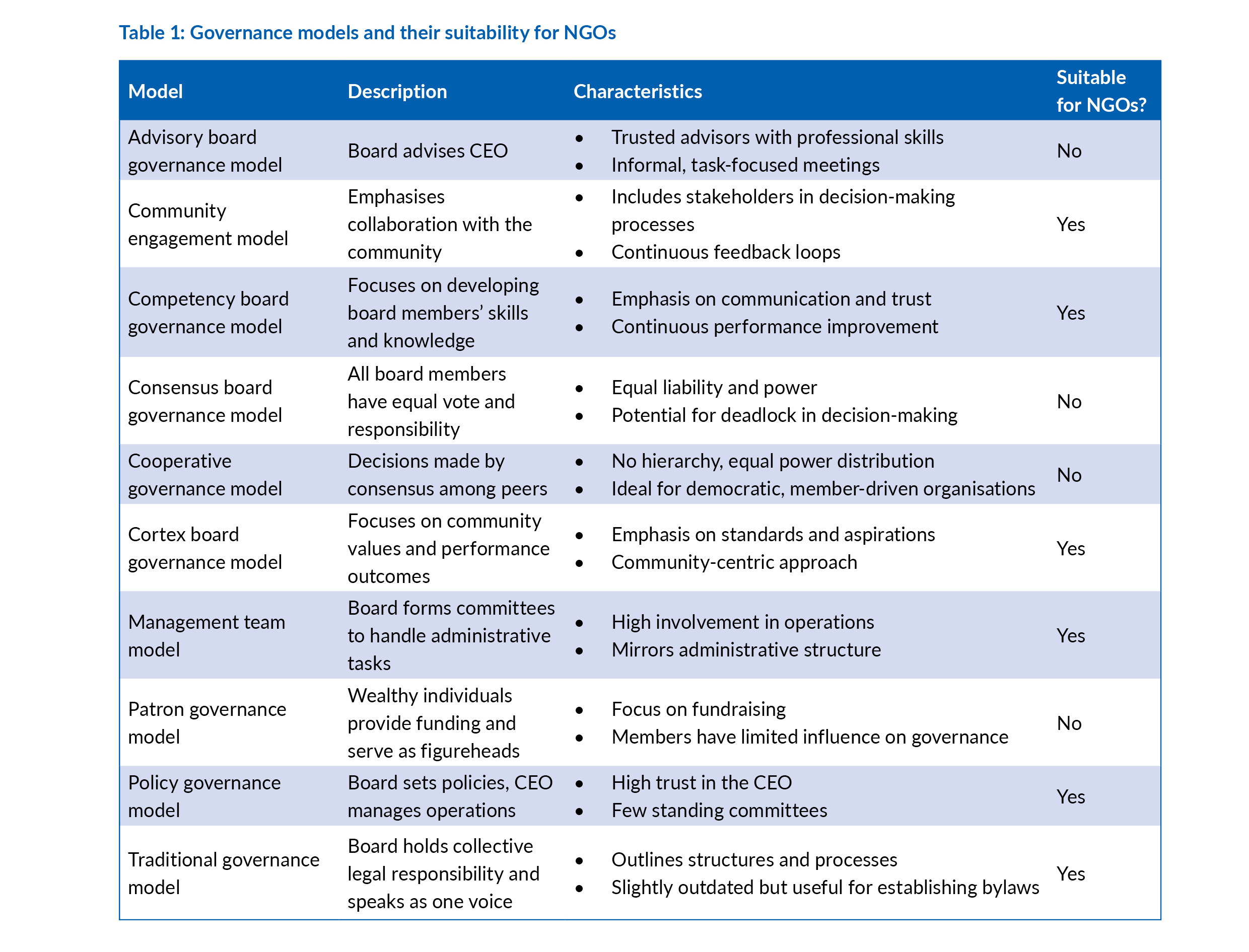NGO governance
Corporate Governance Paper
Competition 2024 – Best Paper: part 1
The Best Paper of the Institute’s latest Corporate Governance Paper Competition explores the key issues in relation to NGO governance and examines strategies for overcoming obstacles in their administration.
Highlights
- NGOs can encounter major governance challenges that compromise their effectiveness and efficiency, and even jeopardise their legitimacy, with weak board governance being the most common
- the main governance obstacles for an NGO include transparency and accountability, financial management and oversight, stakeholder engagement and internal governance structure
- selecting an appropriate governance model is crucial for ensuring effective decision-making, accountability and adherence to the organisation’s values and goals, but not all governance models are suitable for NGOs
The Institute’s annual Corporate Governance Paper Competition and Presentation Awards has been held since 2006 to promote awareness of corporate governance among local undergraduates. In the first of two parts of this year’s Best Paper, the authors identify the primary governance obstacles facing NGOs and discuss a number of applicable governance models that could address the challenges.
Introduction
Non-governmental organisations (NGOs) play a vital role in addressing societal issues and promoting social welfare. Despite this, many NGOs encounter major governance challenges that are likely to compromise their effectiveness and efficiency – and even jeopardise their legitimacy. The most common problem that affects NGOs is weak board governance. One study, from the Stanford Graduate School of Business, found that 56% of NGOs are grappling with this issue. Such problems ultimately impact their performance and strategy to accomplish their goals. To clear the hurdles and increase their effectiveness, NGOs must pay attention to their governance practices.
This paper explores the key governance challenges faced by NGOs and proposes possible strategies to address them. It begins by identifying the primary governance obstacles, including issues related to transparency, financial management, stakeholder engagement and internal governance structures. The paper then examines various governance models and their suitability for NGOs, focusing on the policy governance model, the community engagement model and the management team model. In part two of this paper, we examine a number of case studies to illustrate these models and offer practical solutions for NGOs to improve their governance practices.
Identification of governance obstacles
Transparency and accountability issues
Governance challenges play a significant role in impairing the functionality of NGOs, including their efficacy, efficiency and legitimacy. Transparency and accountability are two of the greatest contradictions surrounding communication and responsibility. Given the complexities of their operations, most NGOs have difficulty in making their practices, decision-making and impact information intelligible and accessible to stakeholders. This lack of transparency fosters perceptions of secrecy or impropriety, erodes public trust and hampers an organisation’s ability to attract support and resources. A study by Saxton and Guo (2009) found that, while most NGOs provided some financial and performance disclosures on their websites, the dialogic mechanisms for stakeholder input and engagement were often lacking, suggesting that there is room for improvement in online accountability practices.
Financial management and oversight challenges
Issues related to transparency are closely associated with financial management and oversight. Many NGOs work in areas that are resource-starved and may not have the systems, expertise or incentive to ensure robust financial controls. This poses a risk of fraud, misuse of funds or inefficient allocation of resources, and undermines an organisation’s ability to achieve its mission and maintain the confidence of donors and other stakeholders. For instance, one study found that fraud in nonprofit organisations is a significant issue and its occurrence is often linked to weak financial controls.
Difficulties of stakeholder engagement
Another significant governance challenge for NGOs is stakeholder engagement. Given their public benefit missions, NGOs have the responsibility to involve and respond to the needs and perspectives of the communities they serve. Despite this, organisations routinely face challenges in genuinely placing those for whom they are designed – including beneficiaries, partners and local stakeholders – front and centre in their decision-making processes, leading to accusations of top-down, unresponsive or externally driven approaches. Effective stakeholder engagement requires inclusive decision-making processes and strong accountability mechanisms.
Moreover, the nuanced nature of stakeholders in the NGO ecosystem can present additional challenges to reconcile varying interests and priorities. Donors may put pressure on NGOs to focus on particular types of activities and/or to deliver certain outcomes, while NGOs will need to ensure that the needs and demands of the intended end users (beneficiaries and local communities) are met. Balancing these competing demands requires strong governance that can facilitate inclusive and transparent decision-making. For example, research indicates that accountability among NGOs in Africa between their donors and the local communities is fraught with tensions and conflicts.
Weaknesses of internal governance structures
Finally, many NGOs continue to grapple with issues of internal governance systems and procedures. Inadequately defined roles and responsibilities, insufficient board oversight, and outdated policies and procedures can lead to a governance failure. However, NGOs may find it difficult to recruit and retain talented, experienced and diverse board members who have the knowledge and attributes necessary for good governance, especially in cultures that have little or no tradition of volunteer board service. Hence, board member commitment and performance is indeed critical to proper governance.
inadequately defined roles and responsibilities, insufficient board oversight, and outdated policies and procedures can lead to a governance failure
In conclusion, the governance obstacles faced by NGOs are diverse and multifaceted, encompassing issues of transparency, financial management, stakeholder engagement, funding constraints and internal governance structures. Addressing these challenges requires a comprehensive and contextspecific approach based on the unique needs and circumstances of each organisation. By establishing robust governance systems, fostering a culture of accountability and leveraging technology, NGOs can enhance their effectiveness, legitimacy and impact in the communities they serve.
by establishing robust governance systems, fostering a culture of accountability and leveraging technology, NGOs can enhance their effectiveness, legitimacy and impact in the communities they serve
Governance models
Overview
As NGOs face various challenges, selecting an appropriate governance model is crucial for ensuring effective decision-making, accountability and adherence to the organisation’s values and goals. In Table 1, we briefly introduce various governance models and their suitability for NGOs, and identify the models that are most relevant and beneficial to them.
We then concentrate more specifically on the policy governance model, the community engagement model and the management team model, since these prioritise clear decision-making processes, stakeholder engagement and effective oversight.

Policy governance model
The policy governance model, developed by John Carver, prioritises the board’s role in establishing guiding principles and policies, delegating authority to the CEO and monitoring compliance and performance. This model is particularly useful for NGOs as it allows the board to focus on strategic direction and oversight, while empowering the CEO to manage day-to-day operations. By clearly defining the roles and responsibilities of the board and the CEO, the policy governance model helps NGOs to maintain accountability and ensure that their activities align with their mission and values.
Community engagement model
The community engagement model emphasises the involvement of stakeholders, such as community members, beneficiaries and partners, in the decision-making process. This model is particularly relevant for NGOs that work closely with local communities and which aim to empower them through their programmes and services. Through stakeholder engagement, these NGOs are able to get a better understanding of stakeholder needs, develop trust, and create more effective and sustainable solutions. The community engagement model also calls for NGOs to be accountable to their constituents, and assures that NGO activities are truly based on the needs of the community and for its benefit.
Management team model
The management team model highlights the board’s active involvement in the organisation’s administration through committees that mirror the structure of the staff’s management functions. In this model, board members are involved in committees, often relating to areas such as human resources, finance, planning and programmes, and they will work closely with staff in those domains. This can provide a workaround for NGOs that, for example, might be reeling in reaction to a fraud scandal, such that the management team model allows board oversight and engagement with core operational areas.
Conclusion
In conclusion, selecting an appropriate governance model is essential for NGOs to effectively navigate the unique challenges they face in their operations and decision-making processes. While some models, such as the patron governance model and the cooperative governance model, may be less suitable for many NGOs, the policy governance model, the community engagement model and the management team model offer valuable frameworks for ensuring accountability, stakeholder engagement and alignment with organisational mission and values. By carefully considering their specific needs and contexts, NGOs can adopt and adapt these models to strengthen their governance practices and achieve their goals more effectively.

